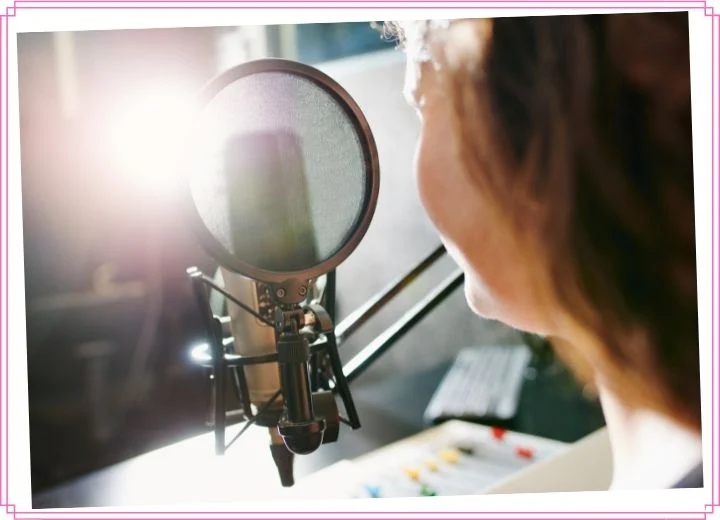Podcasting is essentially an audio-based communication, making audio quality essential. That’s why choosing the right mic is so crucial for podcasters, and that’s where dynamic or condenser microphones come into play.
So, can you use a podcast microphone for singing? Yes, of course. You can use either dynamic or condenser microphones for singing. However, dynamic mics are a better choice.
Can You Use a Podcast Microphone for Singing?
The answer is Yes. In general, dynamic mics are excellent for recording vocals, including podcasting, voiceovers, and singing.
They also work exceptionally well when recording multiple people in the same room. Two types of microphones are commonly used for podcasting: condenser mic and dynamic mic.
Dynamic mics work on the principle of electromagnetism, and they are less sensitive by design. As a result, these mics can handle high sound levels and are generally more affordable.
On the other hand, condenser mics are capacitor-type mics. They are highly sensitive and require an external power called Phantom power. Hence, these mics can produce more spacious and deep vocals.
Check out the following video to better understand the difference between dynamic vs condenser microphones.
What Makes Good Podcast Mics?
Here are a few things that you have to consider before buying a mic for podcasting:
Condenser And Dynamic
These mics are perfect for recording audio.
Condenser mics can record the richness of your vocals. But it can also capture most background noise. Therefore, they are the perfect choice for podcasting in the recording studio.
If you plan to record in an environment with a lot of background noise, such as recording outdoors, we recommend choosing a dynamic microphone.
USB And XLR Connector
There are two ways to attach a mic to your desktop or laptop. The USB connector is the more common option if you’re recording without guests.
If you want to get higher-quality audio or need multiple microphones for multi-person recording, the XLR connector is a good way to go.
Location & Number of People
A USB microphone will also be a perfect choice if you plan to record using a tablet or computer in one location.
Yet, if you have a more complex setup, such as podcasting many people or having more sound sources, consider an XLR microphone.
Polar Pattern
It represents the three-dimensional space where mics best pick up sound. So you will want a microphone with a cardioid polar pattern for podcasting as it is more sensitive at its front, negligibly sensitive on its sides, and does not pick up sound from its back.
Accessories
The pop filter is a handy device in capturing your sound. This device is used to prevent the bursts of air called “pops” or “plosives” from hitting your microphone while speaking.
On the other hand, you should also consider other accessories, including:
- The shock mount is used to prevent your microphone from picking up movement.
- The stand is used to make it easy to sit and record comfortably.
Some Good Podcast Mics
Now you understand how to decide the best mic for podcasting. Please continue reading below to grab our 4 top picks when it comes to mics for podcasting.
Shure MV7
This model comes with a USB connection, allowing you to attach it directly to the computer. However, it still has XLR inputs for those who want to use separate audio interfaces and mixers.
This model can produce studio-quality recordings no matter what room you’re recording in. So whether you’re a new podcaster or enjoy recording more professional audio, the MV7 is a perfect choice.
Fifine USB Condenser Mic
If you cannot make a significant investment in your podcast hobby but still want to get professional-quality sound, you should consider the Fifine USB condenser mic.
The condenser microphone is perfect for capturing clear, crisp sound from its front & sides without picking up the background noise.
It also features a volume knob, and it is also packaged with the desktop tripod stand and 5.9-foot USB cable.
Audio-Technica ATR2100X-USB Mic
This Audio-Technica Mic is the perfect choice for those serious about grabbing high-quality vocals.
It’s a cardioid dynamic microphone, which means it’s excellent at capturing sound from its sides and front and canceling out unwanted background noise.
This podcast mic also features XLR and USB outputs and one headphone jack, allowing you to monitor audio levels directly.
Rode NT-USB Condenser Mic
This model is perfect for singing, recording vocals, and musical performances. The Rode NT-USB comes with a 3.5mm microphone jack and TX-10 closed-back headphones, allowing you to monitor sound levels.
This podcaster-friendly microphone also features a standard stand mount, pop filter, tripod stand, storage pouch.
FAQs
1. Can I use a USB microphone for singing?
In short, high-quality USB mics can work well for singing.
2. What kind of microphone do I need for singing?
In our experience, and most musicians’ and sound engineers’ experience, the best mic type for singing is a cardioid dynamic mic.
Conclusion
The dynamic microphone is the perfect pick for recording vocals, including podcasting, voiceovers, and singing.
They can give you better sound quality for a lower price. In addition, they also do not require a room or studio to be perfectly acoustically treated.
Besides, if you’re willing to spend a fortune on a good recording studio, condenser mics will give you a better and richer overall sound quality.





